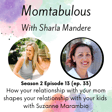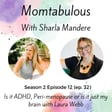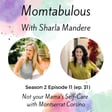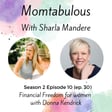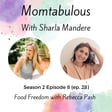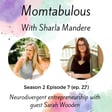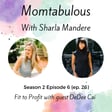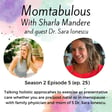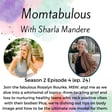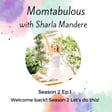Become a Creator today!Start creating today - Share your story with the world!
Start for free
00:00:00
00:00:01

How the Arts Boost Confidence and Resiliency in Kids
With guest Christina Walker, mom of 4 and CEO of Practice, Polish, Perform.
How do some kids learn to bounce back from disappointment better than others?
What can parents say/do to help kids after an opening night or a big game didn't go the way they hoped and planned?
How can we help our kids develop a positive mindset and master their self-talk?
Join me and Christina as we discuss all the ways the arts have helped kids do just that and learn the science of why letting them fail is actually a good thing - and how letting someone else teach that for you is magical.
Access Christina's Road to the Stage program for your performer - https://www.practicepolishperform.com/theroadtothestage/
Use cose Momtabulous30off! for 30% off!
Transcript
Introduction to Christina Walker
00:00:15
Speaker
tabulous. I'm Charla Mander and with me today is Christina Walker. Christina is
00:00:22
Speaker
a private vocal coach and has been a private vocal performance coach for over 20 years. She's the CEO of Practice Polish Perform, a virtual training program for youth performers and is pioneering performing arts mindset education in the youth performing arts industry. She's also a mom of four kids between ages 16 and 20. That's like boom, boom, boom.
00:00:46
Speaker
and lives in Dallas, Texas. Welcome, Christina. Thank you. Thank you. So glad to be here. I'm so excited for our conversation. And anytime we get to talk about the talk mom talk, it's so fun because, you know, that's just a whole thing in itself, right? Being a mom. So yes.
Importance of Arts for Youth
00:01:04
Speaker
Yeah. I mean, I love, I love this conversation we're going to have today because, you know, I have a big background in the arts and I ran my own theater company for a number of years and I still teach dance and choreograph for
00:01:14
Speaker
kids in theater and so it's so important. I think the arts, we're trying to keep them alive, right? Like we gotta keep the arts alive and that comes through this next generation. But there's also so much they can learn in the arts.
00:01:30
Speaker
It's so true, you know, and I think as parents, especially when, when the kids are young and they, and they still really listened to us really well, you know, if mom says it, I'm going to do it. Hopefully, you know, it's a great, it's a great time to, to let them experiment with the arts and get in, whether or not they continue in it. Oh man, the, the stuff that they can learn. And I know you've experienced this on your own with all your background.
00:01:53
Speaker
Just the life skills and things that we can give our kids from just tiptoeing into the arts. They give it a try, you know It's just huge. It's just a huge gift to them And so if you haven't as parents if we haven't done that I say, you know see what's around whether it's in the school or or Something free in the community theater and just just kind of let them try something and you might be surprised they might actually fall in love with it and
00:02:19
Speaker
And if they don't, they're still getting great skills. So I'm with you on that, Charlotte. It's a great way to learn and grow and teach and train them in different ways. Yeah. And I think, you know, for, for boys as well, like girls and boys, like I, you know, I've just so many kids that I've taught that are the boys that play baseball or soccer, and then they also do theater, but it doesn't
Arts and Career Opportunities
00:02:40
Speaker
have to be theater. It doesn't have to dance helps them in their sport, lots of NFL and, and,
00:02:47
Speaker
major league, MB, MBL, right? Take ballet because it helps them with their agility, their flexibility. And you know, these kids are like, what he doesn't take ballet. And I'm like, Oh, watch, watch this. I know I can find it somewhere.
00:03:05
Speaker
But it's a totally different workout. It helps them in their sport too. But we're talking about maybe they play an instrument. Maybe they do painting or pottery or other things too that it's not just singing and dancing. That the odds for me are like this whole gamut of anything that's creative. Yeah. Yeah. And you know, you probably sing. I'm sorry. There was a delay.
00:03:30
Speaker
Sorry, is it even like culinary, you know, like culinary arts, you know, like they can make cool things with food and make it all creative. And yeah, it's so true. You know, sometimes even the backstage aspects of the arts, if you look into, you know, whether they're like building sets or the tech, the lights and the design and everything that goes on in the sound and media booth.
Family and Personal Stories
00:03:53
Speaker
Um, I've, there's some kids and you might've seen it who've kind of cut their teeth on, on the tech, the light and the media and the cameras in the, in the arts, whatever art it was. Um, and they actually, by the time they graduated high school, they're able to get hired out at some great pay rates because of all the experience that the arts has given them. So if it's not something on stage or exactly, you know, playing instrument or whatever, they might find, um, something that supports the arts is.
00:04:19
Speaker
is just lights them up and gives them that thing that's like, I have ownership of something. And then they're learning so much, which I love. I love. And it's growing their skills. It's funny you mentioned athletes. I met my husband. He's my four kids, as you mentioned. I have four kids. And as being in the arts, I was kind of hopeful that one of them maybe would kind of tiptoe into the arts and like it and enjoy it. And they're all very artistic.
00:04:45
Speaker
but
00:05:02
Speaker
of their perspectives and thinking and, um, and, uh, and really give, it can instill confidence.
Life Skills Through Arts
00:05:08
Speaker
And my son, one of my sons, I, I had him learning piano because his hand dexterity wasn't really great and he didn't love piano. Um, so I was teaching him some basics, but, um, but it really, after a couple of years of just, just basic, not, not, you know, everyday practice, his, he was able to have great mobility in his fingers, which have helped him in sports. So you just never know how it's going to help him.
00:05:09
Speaker
not
00:05:33
Speaker
Yeah totally and I love that point too that you know I work when I work with kids it's like
00:05:38
Speaker
And this is not all just about you. There are many people that make this happen without a costume designer, without lighting designers, without, if you have, if you're in a larger theater with a microphone, you have the sound technicians and you have, you know, the people moving the sets on and off, you'd be on stage in the dark with no sound. Nobody could, you'd be wearing what you wore to bed last night, maybe like, you know, you cannot be the thing that it is. And they see these kids on like Disney channel and they think,
00:06:07
Speaker
it just happens and here they are, but there's a lot of hard work and a lot of moving parts to make that show that you really like happen. So I think it gives them an appreciation too of like, I really make sure I hone in when I'm directing, like appreciate this person and say thank you and you know, make sure that you see the work that they're doing because I think it really does teach them just like sports, you know, you can't
00:06:33
Speaker
the only the pitcher on a baseball team, there'd be nobody to catch the ball out there. You know, so it is a team effort and we're a team on stage. And we talk about that a lot too of, of having an improv. If somebody drops the line, what do you do? You can't freeze up there. And it teaches them how to think quick and those skills that you'll use in life down the road. Right.
00:06:55
Speaker
Yeah. So true. So true. And you know, as parents, we, um, depending on where the kids are, how old they are, um, you know, eventually they have to be in those situations that are more of that high pressure feeling, whether they're standing up in class and they have to, uh, you have to read or present or whether it's like a job interview thing. And they, they have to, they feel that feeling of being on a stage, you know, um, of some way though, it's not a stage. They feel some of those things, same internal things kind of trigger.
00:07:24
Speaker
And if they've been involved in the arts in some way, if it's a school play or if it's something instrumental or like even, you know, artistic expressions and things, dance, whatever, they've been involved. It's amazing how that that kind of begins to fortify that skill for them. And I know as parents, when we think of our kids, you know, standing up in front of whomever, whether it's one
00:07:46
Speaker
that it's like this is still a high pressure moment or whether it's many and we can imagine them up there feeling that almost a sense of helplessness or super nervous or I'm freezing because that, you know, we just we don't want that as a parent. It kind of like makes our makes my heart hurt just thinking of my kid being in a situation like that. And so the arts is a way to kind of help prepare and get some of those skills in there.
00:08:09
Speaker
If they stand and they feel that nerves trigger or something, they're like, I felt the same thing when I was walking out into that scene and it was okay, I'm okay. It really transfers well to a lot of things and I think it's a great tool.
00:08:27
Speaker
Yeah, no, for sure. Learning to channel those nerves is crazy. My youngest has gotten into aerial silks, circus arts, which is also beautiful. So she's moved out of performing in musical theater and she's 30 feet up in the ceiling, twisted up in this.
00:08:43
Speaker
You know, but I was so nervous. The first like recital she did, I was like, Oh my God, you're like, they're going to fall. They're going to fall. I was like, are you nervous? Are you nervous? And she, you know, she's 11.
00:08:59
Speaker
And so right now, and I said, were you nervous? There's like a lot of people and then the lights are dark, you know, and there's other lights in your, you know, we're always taught in theater, like no bright lights. I mean, you have the stage lights, but yeah.
00:09:14
Speaker
They get in the actors faces and then that could be unsafe. And so I'm like, they're going, Oh my God, that light is shining right on her. And she's upside down. I'm in there like my, my armpits are dripping sweat, like just ridiculous. And I'm holding my breath and I've, you know, just everything I know not to do, but doing it because I'm the mom and
00:09:37
Speaker
And I said, were you nervous? And she goes, well, a little, but I've done that before. I've been nervous before, and I know I've practiced, so I was fine. And he was like, OK. And this is a kid who suffers from a lot of anxiety, just in general. So being able to channel those nerves and move through the anxiety like that, that came from growing up.
00:10:00
Speaker
you know, doing theater for the last like four or five years for her. And so I think, you know, it was really helpful. And then being able to use it in that sense too, A, kept her safe. Yeah, yeah. It gave me a sense of a mom of like, oh, she's going to be okay. You know, she's going to be okay. We're going to move through this anxiety and she's going to be okay.
Early Arts Education and Community
00:10:23
Speaker
It's so good. That's so good. And the younger they are, it seems the younger they are,
00:10:27
Speaker
when they're into whatever it is, just like in the athletic world, kind of the younger you start your kid into something, the more those skills become like an automatic response. And it's the same thing with the arts, the younger we allow them to be in some of those pressure type situations or performance
00:10:44
Speaker
settings, the more that that skill of, okay, there's some nerves, I'm good with it, you know, the more that skill becomes ingrained in them. And, and as they get older, and they deal, I've noticed this, even in my own business, you know, as I move from the child to the tween to the teen to the young adult, and there will notice even as parents, you'll see this, they begin, sometimes they'll begin to question something about themselves that they might not have questioned.
00:11:13
Speaker
when they were a tween and now they're 13 or 14 and instead of 11, they start seeing things a little differently. And so there's always this, I think a continual
00:11:23
Speaker
kind of an instilling of certain things into the confidence of our kids through different ways, because they're, they're evolving, figuring out who they are. But still, the younger they are, when we've given them some of these foundational skills, the more they do that, that's in there, you know, it's in grade, it's kind of worked into, they might not know it, but it's in there. So it's a great, it's a great way to help them. And I've seen, seen, seen a lot of kids just really
00:11:47
Speaker
come alive, and even even gain some healing through the arts, you know, just emotional stuff and things they deal with at school and things like that. So for sure. Yeah, there's a lot of a lot of kids, I think that find where they belong in
00:12:04
Speaker
that band or the choir or the theater class, if it's accessible to them in their school. And I'm such an advocate for, we need to not be removing arts from schools. They need to come back in. We've been lucky and my kids have had access to the arts here in Southern California, the schools that were actively choosing schools, right, that have that.
00:12:22
Speaker
And I think a lot of times there's kids that that's where they find that place where they belong. They find the kids that are like them. They might be a little different. They might be a little more creative. And so, yeah, absolutely. They need that connection. And a lot of times,
00:12:38
Speaker
because arts are very bonding, right? You have to be so vulnerable and they don't know what it is to be vulnerable when they're eight or nine or even 14, 15 years old, but they're doing it. And you're recruiting that out as a parent to the teacher, the director. You're recruiting that out. Like, you don't need to be home, like, let's get vulnerable.
Parental Support in Arts
00:13:00
Speaker
I know it's all so talented. You're right. You're right. Some things I more and more I'll get parents say I do have parents who are in the arts, you know, and but they'll still bring their kid and they're like, I just they won't they won't learn from me, you know, and of course they're learning from them but there's there's something different. We all know as parents that
00:13:18
Speaker
when the coach tells them the same thing that you've been saying and they just, it's almost, they just grab it better. There's something about that. So yes, kind of let others do it sometimes and it's helpful and it's okay. You don't have to feel the pressure to get everything in them. I think if we
00:13:36
Speaker
surround our kids or play some in environments where we number one, you know, you need to trust the people that they're with, you know, and like sometimes we've had to take one of our kids off of a coach off of a team because we don't appreciate exactly how the coaches a lot of stuff. But as long as you know that you can trust the, the system around them,
00:13:56
Speaker
then release a little pressure from yourself as a mom to get all of it in them and say, you know, I'm setting them, I'm releasing them into this. I trust that environment. And some of those things I'm trying so hard to get, they're going to get it there. And I think as parents, as moms, especially, we wear so many hats.
00:14:15
Speaker
Um, finding a place that we feel good about to, to let our kids learn like the silt, the aerials that you mentioned that your daughter's doing, you know, you can, she's in there growing and learning skills and lit up. And it's not something you have to do, you know, you just have to say, I support you. Here it is. And you know, it's safe and it's good for her. Um, I'll tell you that takes some load, a load off of us, uh, as parents, cause it's, it's hard to do it all, you know, and we shouldn't.
00:14:40
Speaker
Yeah, for sure. And it takes a village, right? And they can be part of the arts are a great village. So okay, let's talk about like, when your kids are, let's say they're, they're doing like theater or music or something, and they have a performance.
00:14:55
Speaker
Maybe they have an audition and, you know, maybe, you know, they come out of the audition and they're like, Oh, which, you know, happens.
Handling Performance Feedback
00:15:04
Speaker
And I do it too. Like I'll go on an audition and I'm like, Oh my God, that was awful. And I messed that up. And I missed it. Oh my God. And you're just spiraling, right? Or they have an opening night and it doesn't go, you know, it's live theater stuff is going to happen. We know that. So
00:15:21
Speaker
I know like what parents say matters. What can we say to help our kid to learn and grow from it and to help keep that self-esteem being built, right? And I think it's the same if we're talking about a sport, maybe they missed that final shot that would have won the game, right? It's all the same thing where maybe they dropped a line or they missed an entrance or they tripped and fell on stage, all of which has happened to me. Yeah.
00:15:50
Speaker
Yeah, it really matters. I've noticed, so my oldest now is 20. And when she was young, she was in competitive gymnastics. I went all the way up, junior Olympics, all that. It was just an very intense sport. And so she was the oldest. I was carting all my kids around always with me. And so she was on this journey. And as parents, we know, for example, we know the routine. We know when they're on the beam or whatever it is. We know what's expected. We know the marks they have to hit.
00:16:20
Speaker
and we know when they don't hit them. And as parents, we get so, I mean, our heart is just on the table. We're watching our heart out there doing whatever, you know, flying through the air with the silks or whatever. And so if we see, when we see our kids not be as excellent as we know they could, or that they hoped for, or that they worked so hard for, I think a couple things, there's a lot of emotions that trigger in us as parents in those moments, you know, because I mean, we're sad for our kid,
00:16:47
Speaker
just a lot and sometimes it's easy to also want to draw attention to the mistakes because we're very aware of them. And so some things I think that we shouldn't do right after they step off stage or off the field or they bombed a test that they were working so hard on. I think there's this period about, I think, about 24 hours that I think is very important that we find what was positive,
00:17:17
Speaker
and we reinforce the positive. And here's a couple of reasons why. Number one, they are highly aware of their mistakes, you know, in those moments, they know their emotions are all, all, all stirred. Um, and they're very aware of the things that went wrong and the result that they wanted to get that they didn't. And, um, so it's really important as parents that we draw attention, uh, help them set their mindset,
00:17:41
Speaker
in a positive direction that, you know, I didn't do this, but I did do this. And here's one of the reasons they're, you know, like think about cement, you know, when they're pouring cement, you know, where you can put your hand print in or sign your name or there when it's, when it's fresh, when it's wet, you know, so to say, and it's, it's able, we were able to make a strong impression in the cement. Our memories and our emotions are a lot like that right after we step off stage or out of a high intense moment.
00:18:11
Speaker
couple reasons. You know, when you feel the nerves and the energy hit the adrenaline, the hormones released in our bodies, adrenaline, cortisol, all this is released in us. So we have a lot internally going on. High emotional moment, high pressure, high risk, benefit value, all that's going on. And right afterwards, it's like our, the emotions and the heart and the memory
00:18:34
Speaker
It's like, it's like it's wet cement almost. So as a parent, if I come and say, well, good job, man, you knew that last line, you missed the last line. I knew you knew it, but, uh, you know, that I'm, what I'm doing is I'm making an impression and the memory. It's really easy for that comment to just to set and stay. Um, and as it does, that develops their mindset, foundation and heart.
00:19:00
Speaker
before the next performance is coming up. When the nerves trigger them, what's going to resurge? What was imprinted right away from that last experience that didn't go as I wanted? Is that making sense? I love that analogy. I've never heard it before, but it's so true. Yeah, it's so fresh.
00:19:20
Speaker
They're so, it's so fresh and you're so emotional and you can spiral so fast. So being able to say like, you know, like a kid would come up to me after opening night and be like, Oh, that went, I messed that up. And, you know, I go, it's okay. It's live theater. It's going to happen. It's fine. Look at you rolled with it. Great. Yes. Good job. You did great. It was fine. Let's move on.
00:19:41
Speaker
No drama. There's always a time, depending on, you know, if it's just a random comment from someone random, then keep it positive and let's go on. If it's someone where I have a better relationship with you, a coach, coach student or a parent student, I know there's going to be times where we can go through
00:20:04
Speaker
things that we let's sharpen it for my students when my students have an audition or something like that I and I'll talk to them on the phone or it's a zoom or they come in here I will always ask them hey what are three of the targets that we worked on that you hit that you did and I have them and it's amazing watching them do that because those who are might be if they're really discouraged it can be really real it's almost like you got a
00:20:29
Speaker
It's like a big pile of fall leaves and you're looking for these little positive things even though they did so much but for them to find it and to verbally communicate it out loud with out loud where their brain hears what their voice is saying because we believe we're about what we hear ourselves say about ourselves
00:20:46
Speaker
It's a scientific study than what we hear others. So for them to find, especially when they're so disappointed, and some of my students are even at the very top levels. I have one who's been on Broadway and different things. Some of those are that kind of have that perfectionist thing. And they could be amazing. But to them, they fall short. And for them to have to find
00:21:10
Speaker
that, okay, I did this, to find something good and say it, it's really important. And as with our kids, it's good to do that, you know, when they're sat after in a performance, didn't go well, whatever test, you know, to just ask them, Hey, you know, if what was something that you did that you that you you're proud of that you did good that you thought you did good, if they can't find it, then then you find it.
00:21:34
Speaker
and say, you know, I saw, I saw when you, when you did drop the line, I saw it didn't, it didn't phase you, you know, and that's what you handled in the moment. And that's excellent. In fact, more there, there was something stronger that grew in you from handling that, then it would have grown if you didn't have to handle it, you know, so it's okay, you know, he sees it to frame it.
00:21:55
Speaker
But let them tell you something that they did back that was good. So I always ask, what's three targets you hit? And then, because we're in a lesson, I say, OK, what if you could redo it? What would be three targets that we need to write down to work on for the next one?
Embracing Mistakes and Resilience
00:22:10
Speaker
And then we assess and move on and empower them for the next time.
00:22:14
Speaker
So yeah, and essentially what you're doing here is rewiring the brain. Right. And we're, and we're, this is a classic coaching, you know, technique of like, what went well, what would I, we'll start a session with what went well. I will end with what went well today. And that's, yeah, super, super good because it, human beings are designed to, we spiral in the negative so easily. Right. All.
00:22:37
Speaker
What's the, I forget what the percentage is, but we have so many thoughts per day and like 80 something percent of them are negative, right? So we need to start teaching the kids to focus on the positive and that that's what you're doing. I love that. And to do, you can do what you just said. I love that you said that because, um, I think helping our kids take ownership of their thoughts
00:22:59
Speaker
is huge. And that's part of the program I just released is it's about performing arts mindset. It's all the mindset that goes on. And so much of it is training what's going on before they're hitting the stage, you know.
00:23:11
Speaker
And like you said, so much is negative and being able to take the negative and re-steer it before that negative thought is sinking me in the moment of nerves. I think it's different than like find the silver lining, right? Oh, I know that really sucked, but what was positive about it? No, it's tell me something else, right? That sucked. Okay. Move on. But what else?
00:23:35
Speaker
can you find something else that went well? And I think letting them fail is a good thing. I'll just keep saying theater in general, what we're doing, but we do what's called a stumble through, which is the first time where you don't have the book in your hand and we don't stop for anything. Things can go horribly wrong and I'm not going to stop and correct. I'm going to bite my tongue and I'm going to take notes and we're just going to keep going because you got to figure it out.
00:24:01
Speaker
And those that first stumble through, it might take three hours to get through a one hour show. And that's okay. But they're going to learn from those failures so that if that happens in front of an audience, now they know what to do. They know what to expect. They've been through it already. And they're training themselves to be a team up there. I'm like, cover, figure it out.
00:24:25
Speaker
They didn't, they didn't walk on stage. They didn't say that line. They dropped, you skipped three pages. It's really hard for me because I'm such an empath and I'm such a mom and I just want to save them, but it's like, got to let them fail. Yeah. And our schools, this could be a whole other episode, but our schools are teaching the kids that failure is wrong and you failed this test and then you get the report card and it's all wrong, but it's a place to learn from.
00:24:55
Speaker
Again, coming back to it, they'll learn that in the arts, right? Just like they learned a sport. They do the football play. It doesn't go right. They go back to the table. The coach draws the thing and they practice it again, right? Same thing.
00:25:10
Speaker
And something I like to do, and I encourage the parents of my students, is not to tell our kids that you're not going to make a mistake. Because a lot of times the kid, the child will say, you know, oh, so what if I drop a line or what if I can't remember it?
00:25:30
Speaker
And I think a natural response from the parent is to kind of put our mama wings over them and say, honey, you're not going to make a mistake. You've worked so hard. You've got this. I've heard you do it a thousand times. And and true, we want to speak positive. But at the same time, I think instead of saying you're not going to make a mistake, let's let's empower them. Because what happens when they're in the moment of performance pressure, they're on the stage and they make a mistake.
00:25:55
Speaker
Not only are they scrambling to figure it out, like you said in the moment, to figure it out, also they're thinking, my mom said I wouldn't make a mistake. Oh my goodness. You know, it's, it's, it can actually trigger and they're not really, you know, that's not a, it's a quick, all these thoughts are going on. Um, it doesn't help them. So now they've made a mistake and, um, they were, they told, they were told they wouldn't. What was going on, you know, this could be disappointing.
00:26:20
Speaker
You're a disappointing mom because you're like, oh no, you're fine. Just, you know, like.
00:26:29
Speaker
Yeah. And instead, just say, you know, you probably won't make a mistake. Or, you know, if you do, I always like to say, if you do, what's the plan? You know, because that empowers them to be, you know, if I drop a lyric, or a line, or a dance step, or, you know, I'm not in the right place on the court at the right time, what do I do? You know, and to just to talk through the, if I make a mistake, what I do part.
00:26:55
Speaker
Because it empowers them because then when it's kind of like walking into a store and I had one kid and one of my sons, he always wanted to find the exit sign, you know, mom, there's an exit sign. I'm like, why? But I noticed, I was starting to get concerned, we're gonna have some natural disaster when we're in Sam's Club or something, right?
00:27:13
Speaker
But we never did. But he's like, there's the exit sign. But I noticed that, you know, in the in the process of being in the store, I knew like, in the back of my mind, I knew exactly where the exit was. And it almost helps the brain to say, if there's an emergency, here's my plan. You know, hey, baby, if you mess up, here's the plan.
00:27:29
Speaker
And it really takes some stress off, I think. So that's one thing that I've found encouraging parents and myself as well. Let's not say it's got to be perfect. That would be great. Few things ever are, right? So let's empower and say, hey, if you make a mistake, what are you going to do? How will we handle it? And that works with school, too. Things in the hallways. It's not going to be a perfect day.
00:27:56
Speaker
You know, you could walk down the hallway and someone kind of side glance at you and now you got to deal with it. You don't know what they're thinking, but in your heart you're thinking, were they thinking about me, right? And your daughter's heart starts to sink all day. Wait a second. It's not going to be a perfect day. That's okay.
00:28:12
Speaker
You know, let's, but let's drive on the right thought road. Let's say, you know, let's keep it positive. If something starts to pull you back and make you feel upset, let's shift it. Um, youth are resilient and they can grab those things and they'll apply them. They hear us, they hear us. We think they don't hear us sometimes, but they hear sometimes like, Oh, it is sinking in.
Introducing the P3 Mindset Method
00:28:34
Speaker
Yeah. And it does teach you how to handle conflict really well. We can tell it. So real quick, talk to me about the P3 mindset method. Oh, yeah. P3 mindset method. Well, P3 is the organization that I run and it stands for practice, polish, perform. I like us to practice. We practice a piece or whatever. We polish it and we perform it. And then we get on stage and perform.
00:29:01
Speaker
It's a step process. But the P3 mindset method is something that I've released with the Performing Arts mindset that I'm pushing forward. And what it is, it teaches our youth, teaches our children, teaches us how to take our thoughts and do something with them. And so here it is. I'll teach our listeners this. Hopefully you can use it for your kids or use it for yourself. I use it all the time. But it's lights, camera, action.
00:29:26
Speaker
Okay, so when I teach it to youth at a workshop, it's like lights, camera, action is my automatic reaction. And we, you know, we do some claps and stops and stuff. So, but three steps, lights. Number one, you said this earlier, we have, we have thousands of thoughts going through our head, you know, and with some of y'all might've heard this, the listeners listening, we can't really control what thoughts we have, but we can kind of like birds, you know, birds, birds can fly over your head and you can't stop it, but you can stop them from building a nest in your hair.
00:29:55
Speaker
Right? So these thoughts are coming. These thoughts are coming. And I can't really always help what's coming, but I can, I can choose if it gets to stay and build like this foundation in my head. So step one, step one is lights. What I do, and I'm going to put it in performance mode. Let's say someone has an audition or something coming up like that. An audition.
00:30:17
Speaker
Um, the first step is to shine, shine a, shine a spotlight on the fact that you're having a thought. Okay. About whatever it is. Let's say your child has a test, something that's a little concerning or that they're working on. Um, I'm eating breakfast. I'm thinking about the audition. And I think there's going to be so many great performers there. I, there's no way I can do it. Okay. A lot of times that thought flies and I just let it stay. I start feeling concerned or worried.
00:30:45
Speaker
All right, so the first step is to realize, shine a spotlight on it, lights, that was a performance thought. This happens really fast when we get it into routine. So realize when I have a thought about whatever it is I'm about to do, okay, shine a spotlight on it. Because then the brain pauses before we let that negative thing start sinking and cementing, so to say, the brain says, wait a second, she's, she's stopping at that thought, what's she gonna do with it?
00:31:10
Speaker
All right, so we have lights and then camera step two, lights camera action is my automatic reaction camera. You know, if you take a picture of something, you're freezing it, you know, you're freezing it in time, there it is. So now we need to, we need to capture our thought.
00:31:26
Speaker
Kind of like taking a picture by we're going to label the thought so I'm eating breakfast. May I have that audition? There's so many people there's no way wait a second. That was a performance thought number two Was it a positive thought or negative thought? Easy to label that was a negative thought so the second step camera capture it was captured in frame it was Paul's We're gonna label it positive or negative. That was a negative thought
00:31:52
Speaker
And then action, I can't get my little probably have a cloud board. Yeah, a cardboard action. We take action on the salt by if it's a positive thought, we repeat it. If it's a negative thought, we replace it with with the positive. What we're doing is setting our mindset foundation so that when we arrive
00:32:10
Speaker
at that audition, at the test, at the game, whatever, we arrived there. We've actually told our brain, we've taken negative thoughts and we've told our brain, wait a second, I'm doing something. I'm going to shift all those into positive thoughts that are just going to create the foundation, a strong one. So just to kind of recap, I'm eating breakfast. I have that addition. Gosh, there's so many people there. I don't know. There's no way I'm going to do a good job. I can't make it. Wait a second. Can't run. Let's capture it.
00:32:36
Speaker
Positive or negative? That was negative. Okay, I'm going to replace it with a positive, taking action on it, going to replace it. You know, there's so many great people there. I'm one of them, and I'm going to do an amazing job. And then I go on.
00:32:50
Speaker
So that's, it takes me longer to explain than to do. But if we, you know, teach your kids, hey, you know, if you have a thought about fill in the blank about the game, just acknowledge, hey, that was a thought about the game. Was a positive net, that was negative. Hey, let's shift it around. I'm gonna be great under pressure and go on. It's a real fast way to process. And I've seen, Charlotte, I've seen amazing things and youth can take that light camera action
00:33:16
Speaker
my automatic reaction to a thought that's starting to sink me, that's starting to make me feel my emotions. I feel stir could be something about a dating relationship. You know, I start feeling, wait a second, something is changing how I feel.
00:33:30
Speaker
I can take control. I can do something. Lights, camera. That's a thought about that. It's making me feel bad. It's negative. Wait a second. I don't know what they were thinking. I don't know if they were talking about me. I'm great. And just go on in the positive direction.
00:33:47
Speaker
That was a lot. Did that make sense? I love it. It's brilliant. I'm in. I'm going to teach my kids. P3, especially I think teenagers, they'll spiral, right? We'll spiral. We got to teach them to not spiral into that negative. So I love that. I love that reframe. And again, reinforcing arts
00:34:06
Speaker
will help you in life, that is something they can take with them into job interviews. And, you know, as they get into marriages, you have conflict and like, I, that's what he meant when he, no, I don't know that. That's what he meant.
00:34:22
Speaker
I said that. I use that often. Yeah. I tell you, I wish, you know, now that my kids are, I have two young adults and a 16 and 17 year old, so 16, 17, 19, 20.
00:34:37
Speaker
I wish in hindsight, I tried my best, but as parents, we grow, we learn, we evolve. We're always parenting and figuring something out. Looking back, I would have loved to have something kind of concise like that to be able to just to help my kids because I can, and they're all different personalities. Every child is different. You think you might have one kind of figured out and the next one comes along, they're totally different.
00:35:05
Speaker
They receive love different. They receive your words different, but having something to be able to say, to help them to say, you know, Hey, that was a solid about your competition was a positive, negative.
Empowerment and Personal Growth
00:35:15
Speaker
It was negative. Hey, just shift that let's change it. And just to be able, especially when they're young, when they'll go through it really easy with you, but then it's a habit like, and it, it happens so fast, like in a heartbeat, they can analyze thoughts and shift them.
00:35:31
Speaker
if they have that as a routine. And as parents, I mean, adults, we can do the same thing. It takes a little more intentionality when we're older to shift mindset habits, but same thing, we can do it.
00:35:43
Speaker
Yeah, for sure. No, I love that so much. And that's awesome. I think and just taking like, I love that you're talking about taking ownership and control. Like I own this, I control this, my feelings, my reaction, my everything. It's such an important skill to learn a lot of adults. Don't learn until adulthood or don't even ever.
00:36:09
Speaker
I mean, you know, my, my oldest is, is in sports now. She does, she does a lot of dance and she does, um, she's cheer and the cheer coach and the end of the season gave out these awards and she got this like sideline star. And the thing she was saying about her was like, this kid can perform like of all the kids on the team. Like when it came time to do.
00:36:29
Speaker
the performance, the dance, the routine. She draws your eye. She was on point. And it was like, oh, that was so cool that someone else saw that. And I said to the coach after, like, she's got a big background in theater. And she was like, no, it's so it's obvious. And it's not that she's up there being overdramatic about things. She was just blocking people off their ledge. And you're stunting and cheering and lifting people over your head. And you're flying in the air. And it's nerve wracking. And she was the one to be like,
00:36:57
Speaker
Let's rein it in. This is going to be fun. We practiced and we're going to do it. It's cool to see that. Yeah, that's great. Totally different. It does translate into sports and other things in life. This is so good. If people want to find out more about the P3 method and where can they find you and how do they do that?
00:37:19
Speaker
Yeah, no problem. If they'll go, the website that has a performing arts mindset is, is the road to the stage.com. So the road like you're driving to a stage and a lot of the program, it's just, it's one training. It's four lessons. It's about 20, 25 minute videos and a workbook.
00:37:39
Speaker
But I take them through the P3 mindset method and some other great life skills. It's geared for youth and performing.
00:37:50
Speaker
you could have had some people not in the arts at all go through it and they they're using it you know to help them so the road to the stage because we're constantly driving to whatever that performance is we're on the road to the stage and how what are how are we handling our thought processes as we're driving there so they go there and that'll have the information yeah and and there's a code for your listeners that that um that we've created for them and um it's uh let's see did i write it down it is
00:38:19
Speaker
mom tabulous 30 off three
Conclusion and Resources
00:38:24
Speaker
zero off. Is that what you have on your end? Yes. Yeah. 30 off an exclamation mark, I guess. Uh, yes, yes it is. And I'm sure you'll, you can put that in the notes, but that, that'll get your listeners 30% off moms and whomever's listening 30% off of the program. If you, if you want to, you know, give it a shot,
00:38:44
Speaker
And also with that, there's live coaching. So your child can log on. It's twice a month where I do live coaching like this with the youth. It's 30 minutes. I develop a new worksheet. It's not an AI kind of thing. It's from my heart, mind, a couple of days before. And where I'm keeping the training of the mindset going. And it's creating some really just healthy youth in their mindset. So just check it out.
00:39:12
Speaker
I love that. Thank you. So generous. And I love, thank you so much for the work you're doing with kids to help empower them and, you know, help them become adults that are positive and productive members of society. You know, they don't have to be on Broadway, right? But they do have to be an adult and they do have to be in the workforce and they do have to go out there and be in the world. And so anyone who's supporting kids and helping to create these positives and be that village for moms, I just appreciate you so much.
00:39:42
Speaker
Yeah, sure. Well, I love what you did. I was thinking this morning as I was getting ready about when I started having kids, social media really wasn't a big thing at that time. I think Facebook was there in my space. I'm really dating myself. Okay.
00:39:58
Speaker
But I was thinking about having something like you do with your podcast is to be able as a mom to take a little breath, a little break, or even in your unending, you know, Uber driving back and forth for your kids to be able to listen to something like what you're producing. Charlotte is, it's just, it's the breath of fresh air, right? And so thank you for what you're doing. Parenting is not easy. And moms don't give up. Don't give up on your kids. And sometimes I know when they hit the tween and teen years, we think,
00:40:29
Speaker
Are they, you know, do they even care? Are they even listening? Um, and it's, it's a different emotional thing as parents. And, um, our job is to raise them and release them into adulthood, like you said. And so don't, don't lose heart. Don't give up, stay in their corner. You're their biggest hero, even though they might not ever tell you, um, you really are, you are. And, uh, so be encouraged. Yeah.
00:40:53
Speaker
Yes. Thank you so much. I appreciate you. This has been so great. And I know there's going to be more to come with us. So yeah, very fun. All right. And for everyone listening, thank you for, thank you for listening or watching. If you're seeing it on YouTube and we will see you in the next episode.
